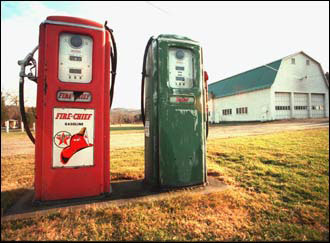The best way to save fuel is to drive less--and Americans are doing just that, according to a new study.
U.S. drivers have fewer cars, are driving them less, and are getting better fuel economy when they do drive them, according to a report issued by the University of Michigan Transportation Research Institute,
The study focused on the rates of fuel consumption per person, per licensed driver, per household, and per registered vehicles. Those fuel-use rates all peaked in 2003-2004 and declined 13 percent to 17 percent between then and 2011, the most recent year with available data.
That decline corresponds with the peaks of new-vehicle ownership and miles driven, as determined in previous studies.
However, during that period, fuel consumption rates decreased more than the rates for miles driven.

Gas Pumps
Those increases will accelerate under Corporate Average Fuel Economy (CAFE) regulations that call for a 54.5 mpg fleet average by 2025.
The decreases since 2003 likely weren't influenced by the recent recession, Sivak writes, because peak fuel consumption occurred before that, the study says.
The total amount of fuel consumed by U.S. light-duty vehicles peaked at 138.8 billion gallons in 2004, but dropped to 123.9 billion gallons in 2011.
In 1984--the first year covered in the study--the total amount consumed was 94.4 billion gallons.
Other analysts have noted that U.S. gasoline usage has peaked, and that it will plummet in the future.
This is due to a number of factors. Consumer preferences are changing: more people are choosing car-based crossovers over truck-based SUVs, and the first plug-in electric cars are starting to make their way onto the nation's roads.
Policymakers are also trying to curb gasoline usage with measures such as the mandated use of certain amounts of biofuels like Ethanol.
_______________________________________________












